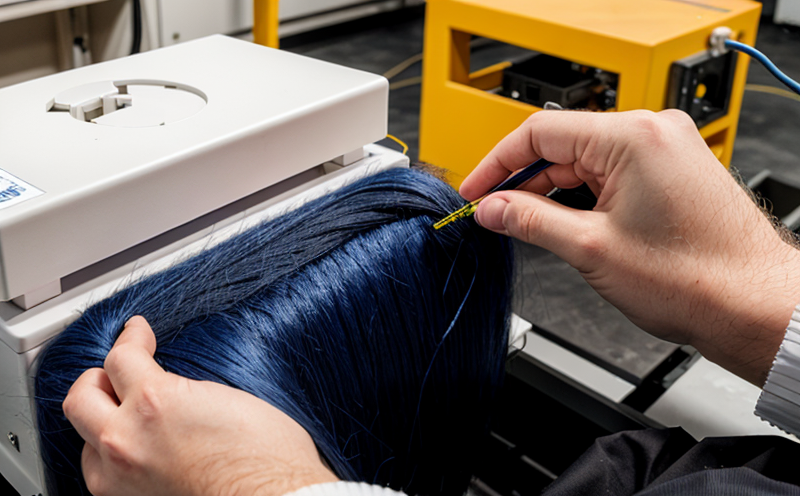GB/T 2910.11 Quantitative Analysis of Acrylic Fiber Content
The GB/T 2910.11 standard provides a quantitative method for determining the acrylic fiber content in textile materials using infrared spectroscopy. This service is essential for quality managers, compliance officers, and R&D engineers who need accurate and reliable analysis to ensure product quality and meet regulatory requirements.
Acrylic fibers are synthetic polymers derived from acrylonitrile monomer units. They offer excellent strength, elasticity, and durability, making them popular in various textile applications such as clothing, upholstery, and industrial textiles. Accurate identification of acrylic fiber content is crucial for maintaining product consistency, ensuring compliance with industry standards, and optimizing manufacturing processes.
Our laboratory adheres strictly to the GB/T 2910.11 standard, which involves the following steps:
- Sample preparation
- Infrared spectroscopy analysis
- Data interpretation and report generation
For accurate results, it is important that the samples are prepared according to the specified guidelines in GB/T 2910.11. This includes ensuring proper drying, cutting, and grinding of the samples to ensure a homogeneous mixture.
| Sample Preparation | Analysis Method | Data Interpretation |
|---|---|---|
| Dry sample at 105°C for 2 hours | Infrared spectroscopy using KBr pellet method | Analyze spectra to identify peaks corresponding to acrylic fibers |
| Grind sample to a fine powder | Compare spectra with reference spectra | Determine content based on peak area ratios |
| Cut sample into small pieces | Analyze multiple samples for consistency | Report results as percentage of acrylic fiber content |
The GB/T 2910.11 method is widely used in the textile industry to ensure product quality and compliance with international standards. It provides a reliable means of quantifying acrylic fiber content, which is essential for maintaining consistency across production batches.
Our laboratory uses state-of-the-art instruments and experienced analysts to provide accurate results that meet or exceed GB/T 2910.11 requirements. We ensure that all samples are handled with care and precision to minimize any potential errors in the analysis process.
Eurolab Advantages
At Eurolab, we pride ourselves on providing high-quality textile testing services using internationally recognized standards. Our team of experts ensures that all tests are conducted with precision and accuracy to provide reliable results that meet or exceed your expectations.
- Experienced Analysts: Our analysts have years of experience in conducting GB/T 2910.11 tests and are well-versed in the latest techniques and methodologies.
- State-of-the-Art Instruments: We use advanced infrared spectrometers to provide accurate results that meet or exceed international standards.
- Comprehensive Reporting: Our reports include detailed information on sample preparation, analysis methods, data interpretation, and final results. This ensures that you have a clear understanding of the testing process and results.
- Fast Turnaround Times: We understand the importance of timely results and strive to provide accurate results within 3-5 working days from receipt of the sample.
- Certified Quality Assurance: Our laboratory is ISO/IEC 17025 certified, ensuring that all tests are conducted in a controlled environment with strict quality assurance protocols.
Choose Eurolab for your textile testing needs and experience the difference that expert analysis can make. Contact us today to learn more about our services and how we can help you meet your testing requirements.
Environmental and Sustainability Contributions
The quantification of acrylic fiber content using GB/T 2910.11 plays a crucial role in environmental sustainability by ensuring that textile products are made from high-quality materials that meet or exceed industry standards. This, in turn, contributes to reducing waste and promoting the use of sustainable resources.
- Reduced Waste: By accurately quantifying acrylic fiber content, manufacturers can ensure that they are using only the necessary amount of raw material for production. This reduces the risk of overproduction and subsequent waste.
- Sustainable Resource Use: The use of high-quality acrylic fibers ensures that textile products are durable and long-lasting, reducing the need for frequent replacements and promoting sustainable resource use.
- Eco-Friendly Manufacturing: By ensuring product quality through accurate testing, manufacturers can reduce the environmental impact of their production processes. This includes minimizing energy consumption, water usage, and chemical waste.
At Eurolab, we are committed to promoting sustainability in all our services. We strive to provide accurate and reliable results that help our clients make informed decisions about their textile products. By choosing Eurolab for your GB/T 2910.11 testing needs, you can contribute to a more sustainable future.
Use Cases and Application Examples
The quantification of acrylic fiber content using GB/T 2910.11 is essential in various industries, including clothing manufacturing, upholstery production, and industrial textiles. Below are some use cases and application examples that highlight the importance of this service.
| Industry | Purpose | Application Example |
|---|---|---|
| Clothing Manufacturing | Ensure product consistency | Manufacturers can use GB/T 2910.11 to ensure that their clothing products contain the correct amount of acrylic fibers, ensuring consistent quality across production batches. |
| Upholstery Production | Meet regulatory requirements | Regulatory bodies often require manufacturers to provide evidence of compliance with GB/T 2910.11 standards. By using this service, manufacturers can ensure that their products meet these requirements. |
| Industrial Textiles | Optimize manufacturing processes | Manufacturers can use GB/T 2910.11 to optimize their manufacturing processes by ensuring that they are using the correct amount of raw material for production. This reduces waste and promotes efficient resource use. |
The quantification of acrylic fiber content is a critical aspect of textile quality control. By accurately identifying and quantifying the acrylic fibers in your products, you can ensure that they meet or exceed industry standards, promote sustainability, and reduce waste.





